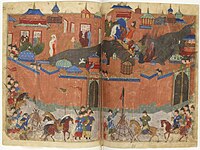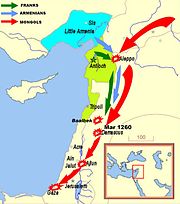Al-Mansur Ali: Difference between revisions
m pos box |
mNo edit summary |
||
| Line 28: | Line 28: | ||
{{s-bef||before=[[Aybak]]}} |
{{s-bef||before=[[Aybak]]}} |
||
{{s-ttl|title=[[List of rulers of Egypt|Sultan of Egypt]]|years=1257 – 1259 |
{{s-ttl|title=[[List of rulers of Egypt|Sultan of Egypt]]|years=1257 – 1259 |
||
}} |
|||
|regent1=[[Al-Ashraf Musa]]|years1=1250–1252}} |
|||
{{s-aft|after=[[Qutuz]]}} |
{{s-aft|after=[[Qutuz]]}} |
||
{{end box}} |
{{end box}} |
||
Revision as of 03:36, 11 June 2008
Al-Mansur Ali ( Arabic: المنصور على ) ( epithet: Al-Malik Al-Mansur Nour al-Din Ali Ben al-Malik al-Mu'izz Aybak ( Arabic: الملك المنصور نور الدين على بن الملك المعز أيبك ) ( b. c.1242, Cairo ) was the second [1] of the Mamluk Sultans of Egypt in the Turkic , or Bahri , line. He ruled from 1257 to 1259 after the assassination of his father Aybak during a turbulent period that witnessed the Mongols invasion of the Islamic world .
Background
After the assassination of his father in 1257, the 15-year-old Al-Mansur Ali was installed by the Emirs as the new Sultan of Egypt with Qutuz as Vice-Sultan and Emir Faris ad-Din Aktai al-Mustareb [2] as Atabeg ( commander in chief ) [3] . Aybak's Vizier Sharaf ad-Din al-Fa'izzi was replaced by Badr ad-din Yussuf who was also later replaced by Ibn Bint al-A'az [4] .
When the Mamluks who fled to the Seljuk Sultanate of Rûm during the reign of Al-Mansur Ali's father Aybak heard of the death of Aybak, they returned to Egypt but they were soon disappointed by finding out that the new Sultan was only a boy who was only interested in pigeons, cockfight and riding donkeys inside the Citadel [5] .
The Mamluks who fled to Syria [6] , amongst them Baibars al-Bunduqdari and Qalawun al-Alfi , left Syria to Al Karak after they had a dispute with An-Nasir Yusuf the Emir of Damascus. In an attempt to conquer Egypt, they sent from Al Karak a force, which included Baibars and Qalawun, to the Egyptian border but the Karak force was countered and badly defeated by an Egyptian force that was sent by Qutuz. Qalawun al-Alfi and Emir Bilban al-Rashidi were taken prisoners by Qutuz force [7] .
The Mongols

Meanwhile, while this was the situation in Egypt, the Mongol army led by Hulagu had infiltrated the eastern border of the Islamic World and was advancing towards Baghdad. In February, 1258, the Mongol army sacked Baghdad, massacred its inhabitants and killed the Abbasid Caliph Al-Musta'sim. Probably not conscience of Hulagu's ambitions, the Ayyubid king of Syria an-Nasir Yusuf sent his son al-Aziz to Hulagu with gifts and asked him for help to recover Egypt. Hulagu asked al-Nasir to send a support of 20.000 knights. On hearing that, The Mamluks who fled from Egypt during Sultan Aybak's reign appealed to al-Malik al-Mughith the Ayyubid king of Al Karak [8] to attack Egypt. al-Mughith agreed and sent his army that included Shahrzurian [9] [10] force to Egypt but was defeated by the Egyptian army led by Qutuz and al-Mughith fled back to Al Kark. Returning to the Citadel in Cairo after defeating Al-Mughith, Qutuz arrested and executed a few Mamluks who did not show loyality to him during the battle against Al-Mughith [11] . In 1259 while the Mongol army was sieging Miyafarqin [12] , Al-Malik Al-Mughith made an attempt to capture Damascus but he was defeated by an-Nasir Yusuf and the conflict between both sides ended by the agreeing of Al-Mughith to send to Damascus all the Mamluks who were taking refuge in Al Kark. Upon arrival to Syria, the Mamluks were arrested by an-Nasir Yusuf [13]. Soon a threatening message from Hulagu arrived to an-Nasir Yusuf [14] and when an-Nasir heard that the Mongol army crossed the river Euphrates and was advancing towards Syria he sent a massenger with a message to Egypt appealing for urgent help. A huge number of Syrians fled from their towns towards Egypt [15] .
Deposing

When the messenger of an-Nasir Yusuf arrived at Cairo and the message was read, the Emirs and the state officials assembled at the court of Sultan Al-Mansur Ali in the Citadel of the Mountain. Qutuz, who was not satisfied about the lax behavior of Al-Mansur and the domination of his mother, Said to the assembly : " We must have a strong and a capable Sultan who can fight this enemy. Al-Malik Al-Mansur is a young boy who does not know how to manage the Kingdom " [16] . Al-Mansur Ali, his brother Qaqan and their mother were arrested by Qutuz and detained inside a tower in the Citadel. Al-Mansur Ali was deposed after being a Sultan for two years, eight months and three days. Qutuz became the new Sultan. " I only meant that we be united to fight the Mongols. We can not do it without having a King. After we go to this enemy and defeat him it will be up to you to put in power whoever you wish." Qutuz told the Emirs [17] . Al-Mansur Ali, his brother and their mother were sent to Damietta then were exiled to the Byzantian Empire of Nicaea [18] . On September 3, 1260. Qutuz army defeated the Mongols in Ain Jalut .
See also
Notes
- ^ Some historians, however, consider Shajar al-Durr as the first of the Mamluk Sultans. Thus, to them Al-Mansur Ali was the third Mamluk Sultan and not the second. ( Shayal, p.115/vol.2.)
- ^ Not to be confused with his namesake and contemporary Faris ad-Din Aktai al-Jemdar who was the leader of the bahari Mamluks and who was assassinated by Al-Mansur Ali's father Sultan Aybak.
- ^ Al-Maqrizi, p. 495/vol.1
- ^ Aybak's Vizier Sharaf ad-Din al-Fa'izzi was detained by Al-Mansur Ali's mother as she was told that he said " The kingdom can not be managed by boys, in my opinion al-Malik al-Nasir should rule ( referring to the the Ayyubid KingAn-Nasir Yusuf ). " ( Al-Maqrizi, p. 495/vol.1 )
- ^ Al-Maqrizi, p.495/vol.1
- ^ See Aybak
- ^ Qutuz set Qalawun free after al-Mu'izzi the Astadar ( Chief of the royal servants ) of the Sultan pleaded for him. Qalawun returned to Al Kark. ( Al-Maqrizi, p. 496/ vol.1 )
- ^ al-Malik al-Mughith Omar Ben al-Adil II Ben al-Kamil Muhammed ( Arabic: الملك المغيث عمر بن العادل الثانى بن الكامل محمد ) was the Ayyubid ruler of Al Kark.
- ^ Al-Maqrizi, p.500/vol.1
- ^ Shahrzuryah were kurds who escaped from Mesopotamia after the Mongol invasion. They deceived al-Malik al-Mughith during the battle and walked over to the Egyptian side. ( Al-Maqrizi,p500/vol.1 )
- ^ Al-Maqrizi, p.500/ vol.1
- ^ Miyafarqin, Silvan in southern Turkey , near Diyarbakir.
- ^ Al-Maqrizi, p.500/ vol.1
- ^ The message was given by Hulagu to an-Nasir's son al-Malik al-Aziz. some of its passages said : " As al-Malik an-Nasir the ruler of Aleppo knows, we have conquered Baghdad by the sword of the almighty God, we killed its knights, we razed its buildings and we captured its inhabitants " " When you receive this message, you should at once submit with your men, your money and your knights to the king of kings the ruler of the earth. By doing that you can be saved from his evil and gain his goodness." " We have heard that the merchants of the Levant and others have fled with their money and women to Egypt. If they hide in mountains we will raze the mountains and if they hide in the earth we will sink the earth down. Where is safety ? none can flee because I own both the land and the sea..The lions were despised by our dignity and the princes and the viziers are held in my grasp. ( Al-Maqrizi, p.506/ vol.1 )
- ^ Al-Maqrizi, p. 506/vol.1
- ^ Al-Maqrizi, p.507/vol.1
- ^ Al-Maqrizi, p,508/vol.1
- ^ ( Al-Maqrizi, p.508/vol.1) - ( Shayyal, p. 122/vol.2)
References
- Abu al-Fida, The Concise History of Humanity
- Al-Maqrizi, Al Selouk Leme'refatt Dewall al-Melouk, Dar al-kotob, 1997.
- Idem in English: Bohn, Henry G., The Road to Knowledge of the Return of Kings, Chronicles of the Crusades, AMS Press, 1969.
- Al-Maqrizi, al-Mawaiz wa al-'i'tibar bi dhikr al-khitat wa al-'athar,Matabat aladab,Cairo 1996, ISBN977-241-175X.
- Idem in French: Bouriant, Urbain , Description topographique et historique de l'Egypte,Paris 1895
- Ibn Taghri, al-Nujum al-Zahirah Fi Milook Misr wa al-Qahirah, al-Hay'ah al-Misreyah 1968
- History of Egypt, 1382-1469 A.D. by Yusef. William Popper, translator Abu L-Mahasin ibn Taghri Birdi, University of California Press 1954
- Shayyal, Jamal, Prof. of Islamic history, Tarikh Misr al-Islamiyah (History of Islamic Egypt), dar al-Maref, Cairo 1266, ISBN 977-02-5975-6
